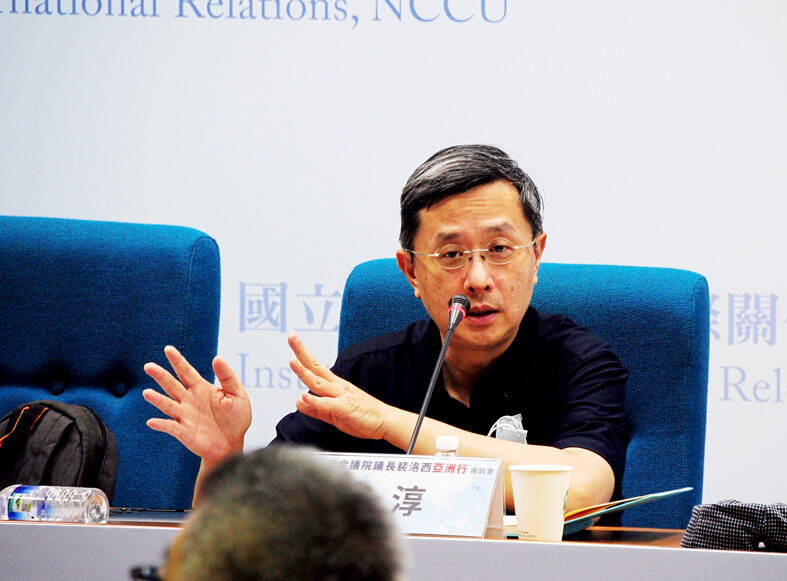A proposed US-led chip alliance is aimed not only at boosting production, but is also seen as a US move to counter China’s growing influence in the global chip market, Chung-Hua Institution for Economic Research economist Roy Lee (李淳) said on Sunday.
The Chip 4 alliance is a proposed alliance of semiconductor powerhouses in the US, Taiwan, Japan and South Korea, to enhance cooperation on the design and production of sophisticated semiconductors.
With a preliminary meeting of the alliance reportedly expected to take place at the end of this month or early next month, the Ministry of Economic Affairs has proposed continuing its collaboration with the US on supply chain resilience and industrial cooperation, as well as semiconductor supply security.

Photo: CNA
Lee, deputy executive director of the Taiwan WTO & RTA Center at the institute, said that the ministry’s proposal to cooperate on supply chain security was made with Taiwan’s needs in mind.
Although Taiwan is strong in semiconductor foundries, it relies on the US and Japan for the supply of equipment and materials, he said, adding that there are areas where the three nations are reliant on each other.
If the US aims only to bring semiconductor production back home, it only needs to negotiate with individual nations, Lee said.
As such, it is believed that the US might want to work with Taiwan, Japan and South Korea to impose controls on semiconductor exports and technology outflows, forming an anti-China group to exclude Beijing from global semiconductor supply chains, he said.
However, the US proposal might put a certain amount of pressure on South Korea due to its economic ties with China, its biggest trade partner, so Washington wants to talk to Seoul to see whether it plans to join Chip 4, Lee said.
China, including Hong Kong, accounts for almost 60 percent of the exports of South Korean chips, according to a report in the Korea Herald, South Korea’s largest English-language daily, which presents a dilemma for Seoul in having to choose between US technology and the Chinese market, he said.
On the pros and cons of Taiwan’s participation in the alliance, Lee said that Taiwan should participate, given the close semiconductor links between Taiwan and the US, especially regarding supply chains and intelligence gathering.
The US Congress last month passed the CHIPS Act of 2022 to strengthen domestic semiconductor manufacturing, design and research.
In addition, Washington has been promoting the Chip 4 alliance and announced a ban on exports of advanced electronic design automation software tools for 3-nanometer and other advanced chips to China in an effort to curb the development of China’s chip industry.

Sweeping policy changes under US Secretary of Health and Human Services Robert F. Kennedy Jr are having a chilling effect on vaccine makers as anti-vaccine rhetoric has turned into concrete changes in inoculation schedules and recommendations, investors and executives said. The administration of US President Donald Trump has in the past year upended vaccine recommendations, with the country last month ending its longstanding guidance that all children receive inoculations against flu, hepatitis A and other diseases. The unprecedented changes have led to diminished vaccine usage, hurt the investment case for some biotechs, and created a drag that would likely dent revenues and

Macronix International Co (旺宏), the world’s biggest NOR flash memory supplier, yesterday said it would spend NT$22 billion (US$699.1 million) on capacity expansion this year to increase its production of mid-to-low-density memory chips as the world’s major memorychip suppliers are phasing out the market. The company said its planned capital expenditures are about 11 times higher than the NT$1.8 billion it spent on new facilities and equipment last year. A majority of this year’s outlay would be allocated to step up capacity of multi-level cell (MLC) NAND flash memory chips, which are used in embedded multimedia cards (eMMC), a managed

CULPRITS: Factors that affected the slip included falling global crude oil prices, wait-and-see consumer attitudes due to US tariffs and a different Lunar New Year holiday schedule Taiwan’s retail sales ended a nine-year growth streak last year, slipping 0.2 percent from a year earlier as uncertainty over US tariff policies affected demand for durable goods, data released on Friday by the Ministry of Economic Affairs showed. Last year’s retail sales totaled NT$4.84 trillion (US$153.27 billion), down about NT$9.5 billion, or 0.2 percent, from 2024. Despite the decline, the figure was still the second-highest annual sales total on record. Ministry statistics department deputy head Chen Yu-fang (陳玉芳) said sales of cars, motorcycles and related products, which accounted for 17.4 percent of total retail rales last year, fell NT$68.1 billion, or

In the wake of strong global demand for AI applications, Taiwan’s export-oriented economy accelerated with the composite index of economic indicators flashing the first “red” light in December for one year, indicating the economy is in booming mode, the National Development Council (NDC) said yesterday. Moreover, the index of leading indicators, which gauges the potential state of the economy over the next six months, also moved higher in December amid growing optimism over the outlook, the NDC said. In December, the index of economic indicators rose one point from a month earlier to 38, at the lower end of the “red” light.